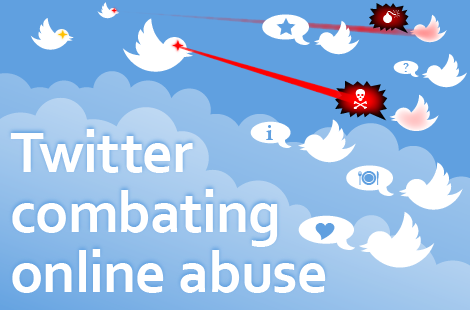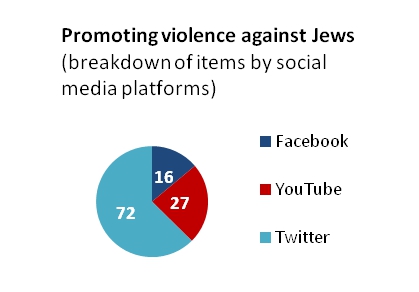Since early this year, Twitter has been on a mission to finally tackle the horrendous abuse and harassment that the platform has become infamous for. Ever since its CEO admitted in a leaked memo that the company “sucks” at dealing with abuse, it has made a slew of changes in the way the platform operates to protect users from abuse and harassment.
It is true that Twitter is particularly vulnerable to abuse by trolls and haters. Recently OHPI analysed 2000 items of antisemitism from Facebook, Twitter and YouTube, which were crowd-sourced using its online hate reporting tool FightAgainstHate.com. The data analysis found that Twitter took the lead in the category of speech “promoting violence against Jews”. (See graph below). The report will be published next week.
So the changes being announced by Twitter are welcome. However, given the speed, and seeming randomness, with which these changes have been announced, it has been hard for users to keep track of them. Here’s a quick reference guide to the changes in the platform to combat abuse and harassment.
More options on the reporting tool: Twitter has expanded its reporting system to include many new options including a box where you can explain exactly what transpired between you and the user you are reporting (the box only pops-up if you are reporting a case of threats of violence against you). This is a great step because it gives the reporter a chance to give a relevant background to the report (for example, explain that user reported is an ex-partner). You can see the latest step-by-step guide on reporting on Twitter here.
Making it easier to approach law enforcement with the necessary information: A problem often faced by users facing threats on Twitter is that the law enforcement has no information to tackle the issue, such as the IP addresses or other identifying information of the abuser, who is often anonymous. But now Twitter is working on a system where the Twitter user can request an email that includes the threatening tweet and URL, the Twitter username of the account making the threat, a timestamp of the threat and the report itself, as well as the victim’s own account information.
This email will have a link to Twitter’s Law Enforcement Guidelines, which provides more information for to the police, including how they can request non-public user account information from Twitter itself.
Unfortunately, this feature has not been rolled out in Australia yet. At least reports by OHPI didn’t give us this option. Further, police in non-US countries currently have to go through a slow process via US law enforcement. It would be good to see that change soon. You can read more about this feature here.
Tracking trolls by their phone numbers: Twitter is also cracking down on serial trolls by tracking their phone numbers. While it is not perfect as the troll can quickly abandon the account and set up a new one, it will certainly act as a deterrent. After all, the idea is to make it harder and harder for people to abuse the platform.
“Quality Filters”: This feature is only available to “verified users” of Twitter, who are prominent personalities in the fields ranging from music, acting, and fashion to media, politics and business. This feature asks the user to permit Twitter to automatically remove any Tweet containing threats, offensive and abusive language, duplicate content and tweets sent from suspicious accounts.
This is again a great move for prominent women personalities, who as discussed by Caitlin Roper in an article for OHPI, are the biggest victims of random threats and abuse. In fact, OHPI had specifically recommended the same here. Prominent Jewish personalities also receive significant antisemitic abuse on Twitter, so this would be a welcome move for them as well.
The problem is that currently there is no way we can request becoming a verified account, and given that Twitter is an American company, it may not always know who are prominent people in other parts of the world. Still it is a step in the right direction. You can read more about this move here.
OHPI is an Australian charity fighting online hate including online racism, religious vilification, misogyny, homophobia, cyberbullying, serious trolling and more. You can find out more about work on our website, our Facebook page and our Twitter account @onlinehate.


